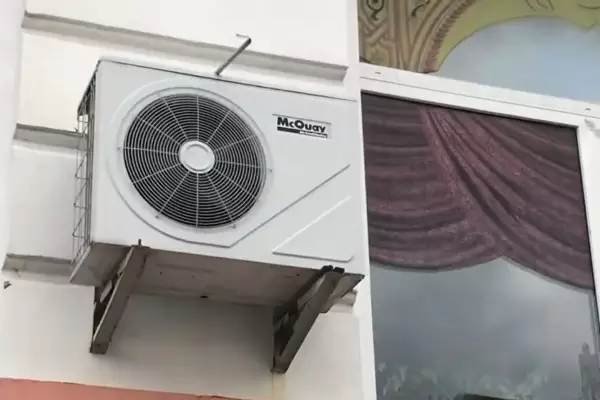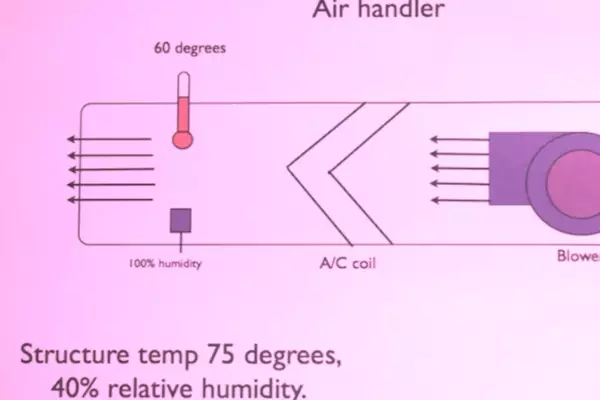Air conditioners are a godsend in those sweltering summer months, providing us with a sweet respite from the relentless heat. However, weather conditions often go beyond simple heat, with humidity frequently becoming an aggravating factor. Humidity, the measure of the amount of water vapor present in the air, can cause discomfort and pose challenges for our air conditioning units.
The crux of this article revolves around the question, do air conditioners work harder in high humidity? Yes, air conditioners have to work harder and expend more energy in high humidity conditions. High humidity levels force the AC units to not just cool the air, but also extract the additional moisture, adding to the workload.
The connection between humidity and air conditioner performance is quite intricate. While the air conditioner is designed to manage indoor temperature, the moisture level in the air significantly affects its efficiency and operational behavior.
Contents
How Air Conditioners Work
Basic Functionality of AC Units
An air conditioner functions by removing heat and moisture from the indoor environment, helping maintain a comfortable room temperature. The AC unit draws in warm air from the room, which then passes over the cooling coils. These coils contain a refrigerant, which absorbs the heat from the air, causing the refrigerant to evaporate.
Role of Humidity in AC Operation
In high humidity conditions, the air conditioner needs to do extra work. Apart from cooling the air, it also has to condense the excess water vapor. The AC unit’s condenser coil is responsible for this task, turning the water vapor into liquid and draining it out.

Humidity and Air Conditioning
Effect of High Humidity on AC
A remarkable fact about high humidity is that it can influence how warm or cool we perceive the air around us. The more humid the environment, the less evaporative cooling our bodies can achieve through perspiration. This phenomenon tends to make us feel warmer than the actual temperature, leading us to seek solace in the cooling arms of an air conditioner.
However, for an air conditioner to create a comfortable indoor environment, it has to perform two essential tasks in a high humidity condition. First, the AC unit must cool the warm air, a function it achieves by drawing in the warm indoor air, passing it over the cooling coils, and pushing the cooled air back into the room.
Secondly, it has to dehumidify the air, which involves condensing the excess moisture from the air and expelling it out of the room. This dual demand on the air conditioner means it has to work for a longer time, consuming more energy, and potentially contributing to higher electricity costs.
AC Struggle: Fact or Fiction?
The notion of an air conditioner struggling under high humidity conditions can be slightly misleading. Instead of struggling, an AC unit merely has to operate for extended durations to fulfill its cooling and dehumidifying roles.
These extended operational periods can increase the wear and tear on the AC unit, making it appear as though it’s having a hard time dealing with the humidity. In truth, the air conditioner is simply carrying out its designed functions, albeit for a longer duration due to the additional dehumidifying requirement.
Impact of Humidity on AC Performance
Increased Workload on AC
The high humidity environment poses a greater workload on the air conditioning units. Typically, an AC unit cycles on and off throughout the day, maintaining the desired room temperature.
However, in high humidity conditions, the AC might have to run almost continuously to keep up with the dual demands of cooling and dehumidifying. This extended operation can lead to an increased rate of wear and tear on the AC components, potentially shortening its service life.
Energy Efficiency: A Casualty
When an AC unit has to run for longer durations due to high humidity, its energy efficiency invariably takes a hit. Higher energy consumption not only increases your utility bills but also contributes to a larger carbon footprint.
Moreover, the extra strain on the power grid during peak summers, when numerous AC units are likely working overtime to combat heat and humidity, can pose additional environmental concerns.
Component Stress and Potential Damage
The continuous running and increased workload can put a significant strain on the AC components, including the compressor, condenser coils, and the fan motor.
Over time, this stress can lead to component failure, requiring expensive repairs. In extreme cases, the damage might be so severe that it necessitates a complete replacement of the AC unit, representing a significant expense.

Signs of Humidity Affecting Your AC
Knowing how to identify the signs of high humidity affecting your AC can be helpful in taking timely corrective measures.
Ice Formation on AC
Ice forming on the evaporator coils is one clear indication. As the air conditioner works overtime to dehumidify the air, the evaporator coils can become excessively cold, leading to condensation and subsequent freezing. This ice formation can hinder the AC’s cooling performance and potentially lead to other mechanical issues.
Overly Moist Indoor Air
If your indoor air still feels uncomfortably damp despite the AC running, it’s a sign that the AC unit is unable to effectively manage the high humidity level. You might also notice condensation on windows and other surfaces in the room, indicating excessive indoor humidity.
Frequent AC Cycle: A Warning
An AC that frequently cycles on and off or runs continuously is another indication of high humidity conditions. Since the AC has to operate longer to manage the humidity, these extended operational periods can lead to more frequent cycling.
Managing Humidity for Better AC Performance
If you live in a region with high humidity, it’s essential to know how to optimize your AC performance under such conditions.
Role of Dehumidifiers
A dehumidifier can be an effective tool in managing indoor humidity levels. This device works by removing excess moisture from the air, helping to maintain a comfortable humidity level in the room. By reducing indoor humidity, a dehumidifier can significantly ease the load on your AC, allowing it to cool the room more efficiently.
Importance of Regular AC Maintenance
Regular maintenance of your AC unit is crucial in high-humidity conditions. A well-maintained AC unit can operate more efficiently, manage humidity better, and is less likely to break down under the increased load.
Regular maintenance should include cleaning or replacing the air filters, cleaning the condenser and evaporator coils, and checking for any potential mechanical issues. A professional AC technician can also ensure the refrigerant level is optimal, which is vital for efficient cooling and dehumidifying.
Utilizing Thermostat Settings
Modern thermostats come with a variety of settings that can help manage high humidity conditions. For instance, some thermostats have a ‘dehumidify’ or ‘dry’ mode, specifically designed to reduce indoor humidity. In this mode, the AC focuses more on dehumidifying than cooling, which can be particularly useful in high humidity scenarios.
Frequently Asked Questions
Does high humidity affect the lifespan of my AC unit?
Yes, continuous operation in high humidity conditions can place a greater stress on the AC components, potentially shortening the unit’s lifespan. Regular maintenance and using additional dehumidifying solutions can help manage this impact.
Can I reduce the impact of high humidity on my AC?
Yes, strategies like using dehumidifiers, maintaining regular AC maintenance, and using appropriate thermostat settings can significantly reduce the impact of high humidity on your AC unit.
Do all AC units struggle with high humidity?
No, not all AC units have the same difficulty with high humidity. Some high-end AC units come with advanced features that allow them to manage high humidity levels more effectively. However, generally, most AC units will have to work harder in high humidity conditions.
Conclusion
High humidity is not just a test of our personal comfort but also poses a significant challenge for our air conditioning systems. Understanding the relationship between humidity and AC performance can help us manage our indoor environments better, ensuring efficient cooling without overburdening the AC unit.
Proactive measures like using dehumidifiers, keeping up with regular AC maintenance, and smartly using thermostat settings can greatly enhance our AC units’ ability to handle high humidity. This knowledge empowers us to navigate the sultry labyrinth of high humidity, maximizing our comfort while minimizing energy costs.

